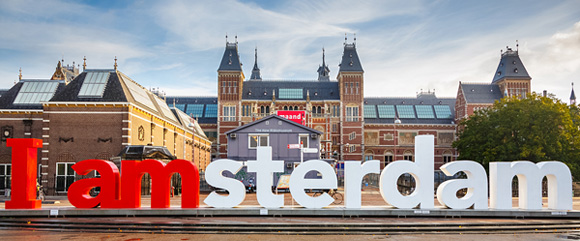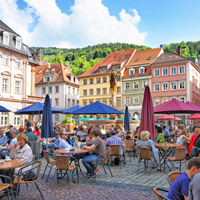Retire in Amsterdam
Last updated on Apr 07, 2025
Summary: Retirees are attracted to Amsterdam, Netherlands for its vibrant culture, beautiful canals, and world-renowned museums. There are several retirement communities in Amsterdam, offering a variety of amenities such as fitness centers, swimming pools, and social activities. The cost of a nice two-bedroom home in Amsterdam is typically around $400,000 USD, while a nice three-bedroom home can cost up to $600,000 USD. The weather in Amsterdam is generally mild, with temperatures ranging from the mid-30s to the mid-60s Fahrenheit throughout the year.

What is it like to retire in Amsterdam?
"Retirees in Amsterdam and its surroundings enjoy a vibrant and active lifestyle. There is a large expat community in the area, offering retirees the opportunity to meet people from all over the world and make new friends. There are plenty of cultural attractions to explore, such as the Rijksmuseum, the Van Gogh Museum, and the Anne Frank House. There are also plenty of recreational activities to enjoy, such as cycling, walking, and sailing. Amsterdam also offers plenty of nightlife, with a variety of bars, clubs, and restaurants to explore," said a person in Amsterdam.
 Homelike
HomelikeGet Quote
We've partnered with Homelike, to connect expats and newcomers with temporary accommodations in Netherlands. If you're moving to Netherlands, rent a short-term, furnished apartment or home for the first few months from Homelike and take your time figuring out the best place to live in Netherlands.
 Homelike
HomelikeWe've partnered with Homelike, to connect expats and newcomers with temporary accommodations in Netherlands. If you're moving to Netherlands, rent a short-term, furnished apartment or home for the first few months from Homelike and take your time figuring out the best place to live in Netherlands.
Get Quote
What advice do overseas retirees have for others considering retiring abroad?
"Retiring abroad can be a great way to experience a new culture and lifestyle. In Amsterdam, retirees should take the time to explore the city and get to know the locals. It is important to research the cost of living and healthcare options in the area before making the move. Additionally, retirees should make sure to take advantage of the city's many cultural attractions and activities. Finally, it is important to stay connected with family and friends back home, as this can help make the transition to a new country easier," explained one retiree living in Amsterdam.
What are the most challenging aspects of retiring in Amsterdam?
"One of the most challenging aspects of retiring in Amsterdam is the high cost of living. Amsterdam is one of the most expensive cities in Europe, and the cost of housing, food, and other necessities can be prohibitively expensive for retirees on a fixed income. Additionally, Amsterdam is a very crowded city, and finding affordable housing can be difficult. Furthermore, the language barrier can be a challenge for retirees who do not speak Dutch. Finally, Amsterdam has a very active nightlife, which can be overwhelming for retirees who are used to a more sedate lifestyle," said one retiree in living in Amsterdam, The Netherlands.
What are the most rewarding aspects of retiring in Amsterdam?
"Retiring in Amsterdam offers a variety of rewarding experiences. The city is known for its vibrant culture, with a wide range of museums, galleries, and other attractions to explore. Amsterdam is also home to a diverse range of restaurants, cafes, and bars, providing plenty of opportunities to socialize and enjoy the local cuisine. The city is also renowned for its picturesque canals, parks, and gardens, providing plenty of opportunities to relax and take in the beauty of the city. Additionally, Amsterdam is well-connected to the rest of Europe, making it easy to explore the continent," explained one retiree living in Amsterdam.
What are healthcare services like in Amsterdam?
We asked retirees if they have access to good medical care in Amsterdam. They wrote:
"Healthcare services in Amsterdam are of a high quality and are easily accessible. The city has a wide range of public and private hospitals, clinics, and medical centers that offer a variety of services, including general and specialized medical care, emergency services, and preventive health care. Amsterdam also has a number of specialized medical centers that provide specialized care for specific conditions, such as cancer, heart disease, and mental health. Additionally, Amsterdam has a number of pharmacies and health food stores that offer a variety of products and services related to health and wellness," said a person in Amsterdam.
How do I meet people in Amsterdam?
When we asked people living in Amsterdam about club and activities where newcomers can meet others, they responded:
"Expats in Amsterdam often join clubs and activities such as language exchange groups, sports teams, and cultural events. Expats can also meet people by attending local festivals, joining meetup groups, or attending networking events. Additionally, many expats find it helpful to join online forums and social media groups related to their interests," said a retiree who moved to Amsterdam, The Netherlands.
What is life like in Amsterdam?
When we asked people living in Amsterdam what life is like and how people spend their time, they said:
"Living in Amsterdam as an expat or digital nomad can be an exciting and rewarding experience. The city is known for its vibrant culture, diverse population, and excellent quality of life. Expats and digital nomads can enjoy the city's many attractions, including its world-renowned museums, canals, and parks. Amsterdam is also home to a thriving startup scene, making it an ideal place for entrepreneurs and freelancers. The city is well-connected, with excellent public transportation and a wide range of international flights. The cost of living in Amsterdam is relatively high, but there are plenty of affordable housing options available. Expats and digital nomads can also benefit from the city's excellent healthcare system and its welcoming attitude towards foreigners," commented one retiree living in Amsterdam, The Netherlands.
What do I need to know before retiring in Amsterdam?
When we asked people what advice they would give someone preparing to move to Amsterdam, they said:
"Before retiring in Amsterdam, expats should be aware of the cost of living, which is higher than in many other cities in the Netherlands. Additionally, expats should research the healthcare system and the availability of medical services in the city. It is also important to understand the Dutch language and culture, as well as the local laws and regulations. Expats should also consider the housing market in Amsterdam, as well as the availability of public transportation and other amenities. Finally, expats should research the job market in Amsterdam to ensure that they can find suitable employment opportunities," said one retiree in living in Amsterdam, The Netherlands.
What type of recreational activities are there in Amsterdam?
"Amsterdam offers a variety of recreational facilities for visitors and locals alike. The city is home to a number of parks, including the Vondelpark, which is the largest park in the city and features a variety of activities such as walking, cycling, and boating. Other parks include the Oosterpark, Westerpark, and Sarphatipark. The city also has a number of museums, such as the Rijksmuseum, Van Gogh Museum, and Stedelijk Museum, which offer a variety of art and cultural experiences. Additionally, Amsterdam is home to a number of theaters, such as the Royal Theater Carré and the Stadsschouwburg, which offer a variety of performances. Finally, the city is home to a number of recreational activities, such as cycling, walking, and boating, as well as a variety of restaurants, cafes, and bars," said one retiree in living in Amsterdam, The Netherlands.
Where will I buy groceries and do other shopping in Amsterdam?
"In Amsterdam, expats can find a variety of grocery stores and other shopping options. Albert Heijn is the largest supermarket chain in the Netherlands, and they have several locations throughout Amsterdam. Expats can also find international grocery stores such as Marqt, which specializes in organic and sustainable products, and Jumbo, which offers a wide selection of international products. For other shopping, the Kalverstraat is a popular shopping street in the city center, and the Nine Streets area is known for its boutique stores and independent shops. Additionally, the IJ-Hallen flea market is held every month and offers a variety of vintage and second-hand items," remarked one retiree in Amsterdam.
About the Author
 Joshua Wood, LPC joined Expat Exchange in 2000 and serves as one of its Co-Presidents. He is also one of the Founders of Digital Nomad Exchange. Prior to Expat Exchange, Joshua worked for NBC Cable (MSNBC and CNBC
Primetime). Joshua has a BA from Syracuse and a Master's in Clinical and Counseling Psychology from Fairleigh Dickinson University. Mr. Wood is also a licensed counselor and psychotherapist.
Joshua Wood, LPC joined Expat Exchange in 2000 and serves as one of its Co-Presidents. He is also one of the Founders of Digital Nomad Exchange. Prior to Expat Exchange, Joshua worked for NBC Cable (MSNBC and CNBC
Primetime). Joshua has a BA from Syracuse and a Master's in Clinical and Counseling Psychology from Fairleigh Dickinson University. Mr. Wood is also a licensed counselor and psychotherapist.
Some of Joshua's articles include Pros and Cons of Living in Portugal, 10 Best Places to Live in Ireland and Pros and Cons of Living in Uruguay. Connect with Joshua on LinkedIn.
Other Questions:
- What do I need to know before moving to Amsterdam?
- How do I find a place to live in Amsterdam?
- What is a typical expat home or apartment like in Amsterdam?
- What is the average cost of housing in Amsterdam?
- Should I buy or rent a home in Amsterdam?
- What should I pack when moving to Amsterdam?
- What cultural faux pas should I try to avoid making in Amsterdam?
- What advice do you have for expats having a baby in Amsterdam?
- What are healthcare services like in Amsterdam?
- Is the cost of living in Amsterdam high?
- Will I save money living in Amsterdam?
- Why do people move to Amsterdam?
- How are healthcare services in Amsterdam?
- What are medical services in Amsterdam like?



